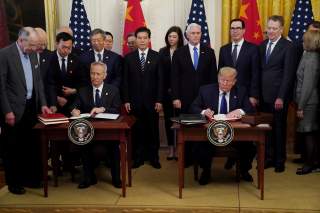The China Challenge
The United States needs to compete with China within international institutions and country-by-country. It is hard to beat something with nothing. America should promote better ideas and practices and offer attractive partnerships, instead of retreating and bullying.
The United States is a stakeholder with interests, too. Some 250,000 Americans died in Asia in the twentieth century. To paraphrase Napoleon, the borders of a nation’s interests are marked by the graves of its soldiers. The United States should not abandon its stake for shaky trade announcements designed to get through elections, or by degrading alliances into ties of convenience based upon shady accountings of troops, tribute, and trade.
THE UNITED States needs to be alert to greater risks of miscalculations and unintended consequences. Kevin Rudd—a former prime minister of Australia, a good friend of the United States, and a close student of China—recently warned:
“A fully ‘decoupled world’ would be a deeply destabilizing place, undermining the global growth assumptions of the last 40 years, heralding the return of an iron curtain between East and West and the beginning of a new conventional and nuclear arms race with all its attendant strategic instability and risk.”
A slide into Sino-American conflict—whether intentionally or by accident—would lead to incalculable costs and dangers. The twentieth century painted a shocking picture of industrial age destruction; do not assume that the cyber era of the twenty-first century is immune to crack-ups or catastrophes of equal or even greater scale.
The United States needs to enhance its influence through long-term partnerships with allies and partners. America needs to save, update, and even expand the international trading system of openness, rules, and fair settlements of disputes. Americans need to represent our country abroad as purveyors of principles, as well as commerce, treating people from other lands with dignity and respect. And the United States needs to cooperate with China to mutual benefit while managing differences.
Cooperation as stakeholders does not mean the absence of differences. Stakeholders compete, too. The management of their differences should take place within a larger framework that offers common benefits.
When I selected the word “stakeholder” in 2005, I had in mind that stakeholders have interests in a shared enterprise. That interest is worth work, even perseverance, to preserve, adapt, and grow. Only the foolish or faint-hearted just yield or abandon the enterprise.
Robert B. Zoellick is a former World Bank President, U.S. Deputy Secretary of State, and U.S. Trade Representative.
Image: Reuters

